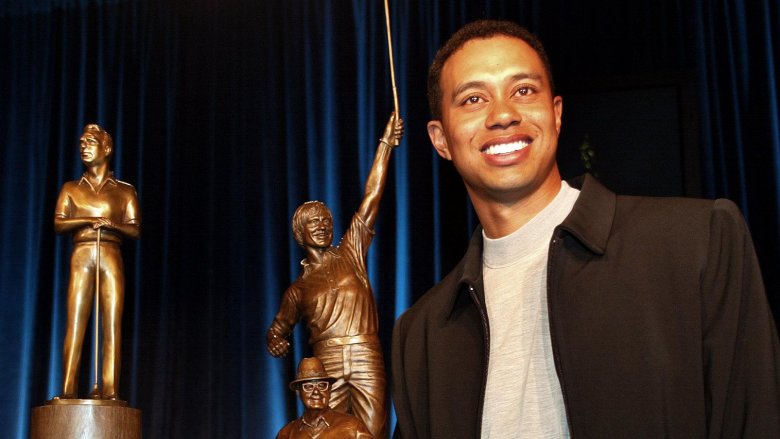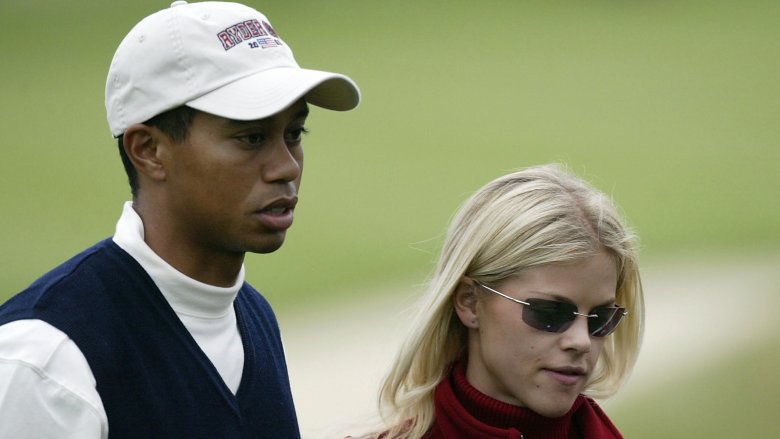The Untold Truth Of Tiger Woods
Tiger Woods is to golf what Wayne Gretzky is to hockey and Pelé is to soccer: A primal force of raw talent and technical finesse that all other players will be compared to for all time, whether they like it or not. Woods' illustrious career and discordant personal life have both been turbulent to say the least, but through it all, he's been the first name that pops in most peoples' minds when they think of golf.
Regardless of your personal opinion of Woods, his influence is hard to deny. Though it's hard to fully measure all the ways he has changed golf, you don't really seem to see as the same sorts of headlines about other golfers. Woods is a true titan of his industry, and like most titans, he didn't get to his position easily. His life has been a curious combination of grueling climbs and shocking setbacks, and today, we're going to find out all about them. This is the untold truth of Tiger Woods' life.
It's not his real name
Tiger Woods is such an impossibly killer name that it's easy to imagine his parents' only expectations were for him to become a top athlete or an action movie star. Tiger. Woods. Say it out loud a couple times; feel the power. It's so magnificently predatory, yet oddly fitting for the deceptively laid-back yet supremely competitive environment of golf, you'd be forgiven for think it couldn't possibly be his real name ... because you'd be quite correct.
As Golf News Net explains, Tiger's real name is actually Eldrick Tont Woods. Perhaps understandably, he tends to shy away from "Eldrick" in his professional life, though he has referenced his full name occasionally, such as in the name of his company, ETW Corporation. Fortunately, the awesomeness of the way he got his "Tiger" nickname almost makes up for it not being his birth name. When Eldrick's father, Earl Woods, was in Vietnam, he met a South Vietnamese soldier, Colonel Vuong Dang Phong. Phong became one of Earl's best friends, and the colonel was apparently a fearsome enough dude that people called him "Tiger." Earl later started calling his son by the same name as an homage to his old friend.
Although the war Woods is waging tends to feature a lot more greens and putters than Phong's version did, it's safe to say he has been more than successful enough to live up to this warrior name.
Trademarks and business dealings
It's pretty common for successful athletes to set up businesses to help manage and grow their vast fortunes. However, when you stop being just a regular person who's good at sports-for-money and become one of the people who defines your sport, your spoon is likely to wind up in more soups than most people would expect.
Tiger Woods is no exception. According to a 2015 article by Golf News Net, the golfer owns three different corporations and is involved in some capacity with a whopping 45 trademarks. Not all of them are active, of course. The U.S. Patent and Trademark Office lists "only" 23 of his trademarks as actively used, and some of the inactive ones are truly hilarious — think Tiger Woods-branded foot powder, insect repellent, and medicated skincare preparation. Still, the ones he's stuck to are often virtual licenses to print money, and some secure the rights to his likeness, name, and autograph to an astonishing degree.
Because famous coattails tend to attract plenty of hop-ons, there have been plenty of non-Woods-affiliated entities trying to get in on that hot Tiger Woods merchandise money over the years. Between 1995 and 1996, four different trademark applications for variations of Woods' name were filed, often with the claim that "Tiger" simply referred to the animal, not the rising superstar. In 2010, one particularly enterprising person even briefly held the trademark for the name "Tiger's Wood," which would have been a sort of headcover for men's ... personal putters, if you will.
The golf prodigy
Tiger Woods is very good at golf. That's kind of his entire thing. In fact, as Golfweek can attest, if there's anyone who can be defined as "born ready," it's probably him. Just ask Bob Hope, who lost a putting contest against Woods in 1978 when the golfer was just 2 years old. In 1991, Woods took his first U.S. Junior Amateur golf championship (youngest winner ever, naturally), and by February 1992, sponsors were turning all kinds of tricks to allow the 16-year-old prodigy to compete in his first PGA tournament. By 1996, when he turned pro, he had a total of six assorted U.S. Junior Amateur and Amateur championships under his belt.
Obviously, Tiger's professional years haven't exactly been without success, either. He won Masters and the U.S. Open with the largest margins in history, won numerous championships and Player of the Year awards, was named Athlete of the Decade by the Associated Press in 2009 and, of course, became the youngest player ever to hold the No. 1 spot in world golf rankings. Even though his 2010s slump slowed his pace, he seems to have bounced back with his recent Masters win. As of April 2019, Woods holds 15 major championships, and since he's just 43 years old there's a very real chance that he's a serious contender to beat the record 18 championships of all-time great Jack Nicklaus.
His right to use his own name was once called into question
When you're a star athlete, your name is money, and chances are you'll end up signing a bunch of contracts with assorted companies to get a slice of that money. This jumble of deals and rights issues can get pretty confusing, and as Tiger Woods found out in 2015, it may even lead to a situation where people think you don't have the legal right to use your own name. CBS Sports reports the strange story of a restaurant Woods was planning to open in Jupiter, Florida, when the developer suddenly said that the project was in dire straits. According to him, they had to call the restaurant The Woods Jupiter. They wouldn't be able to use the name "Tiger Woods" in the restaurant's name because Woods' longtime partner Nike owned the rights to his name.
Fortunately for Woods, both his agent and Nike soon stepped up and said the golfer absolutely has the right to his name and always had. Still, as Heavy notes, the establishment ultimately was named The Woods Jupiter and largely avoids association with Woods' image. Tiger says he sees no need to associate his person with the restaurant and wants the food to be the driving force in this venture. Hmmm.
His insane earnings
To really drive home how much money Tiger Woods makes, it's worth looking at the year 2017, the tail end of the worst slump of his career. He was a less-than-stellar 51st in the world golf rankings, hadn't won a tournament since 2013, and was coming off a series of injuries and disastrous events in his personal life. According to CNBC, he earned $43.3 million that year and was the best-paid golfer in the world.
That may seem like a massive fortune, but it's peanuts compared to the total $1.5 billion Woods has earned since turning pro in 1996. Obviously, playing golf doesn't pay that well — "just" $1.3 million of Woods' earnings in 2017 came from his salary and winnings. The bulk of his considerable fortune comes from lucrative sponsorship deals with companies like Nike, Bridgestone Golf, and Monster Energy. The reason he has been able to maintain such a considerable income through thick and thin is a phenomenon CNBC dubs the "Tiger Effect": Woods is a super-famous household name who has transcended his sport, so even when he's playing relatively poorly, his mere presence drives viewer figures up and his endorsements do amazing things for a company's sales.
His struggles with racism
As a multiracial man with black, Asian, Native American, and Caucasian heritage, Tiger Woods has encountered many racism-fueled difficulties in the lily-white landscape of golf. In his book The 1997 Masters: My Story, Woods describes his initial times in the industry as uncomfortable. He has been discriminated against and has sometimes been unable to buy a drink or to change in the same locker rooms as white players.
The athlete has received unsavory comments from his peers, as well. CBS Sports says in 1997, golfer Fuzzy Zoeller had this to say about young Woods: "You pat him on the back and say congratulations and enjoy it and tell him not to serve fried chicken next year. Got it. Or collard greens or whatever the hell they serve." Eesh. In 2008, Golf Channel's Kelly Tilghman made a lynching joke about Woods. In 2011, caddie Steve Williams (a former employee of Tiger's) said he wanted to shove an award "up that black arseh*le." Golfer Sergio Garcia resurrected the fried chicken jokes in 2013. And those are just the comments that made the news — who knows how much he's had to endure? As Woods himself puts it in his book: "I hoped my win would open some doors for minorities. My biggest hope, though, was we could one day see one another as people and people alone. I wanted us to be colorblind. Twenty years later, that has yet to happen."
Infidelity issues
In late 2009, the world found out that Tiger Woods had been chasing more than just championships. According to Biography, reports started surfacing that Woods had been involved in an extramarital affair with a nightclub manager. As the story was circulating, a new, even more dramatic one emerged: On November 27, Woods had allegedly collided with a fire hydrant outside his home, and his wife Elin Nordegren had broken the car's back window with a golf club. Together, the two stories smelled like major marital trouble, and Woods initially chose to simply stay silent about it all.
However, more and more news of Woods' infidelities kept emerging. The Globe and Mail details the chronology of a life falling apart with staggering speed: Between November 25, 2009, and January 31, 2010, a total of 19 mistresses emerged, and hordes of valuable sponsors dropped Woods. Eventually, the golfer decided to come clean. On February 19, he admitted and apologized for everything, though this did little to alleviate the concerns of some sponsors (let alone his wife, who was noticeably absent from his side). At least in public, Woods remained hopeful that he might be able to work things out with Nordegren, but it soon became apparent that the trust had been irrevocably broken. The couple divorced in August 2010.
His relationship with Nike
Throughout his professional career, Tiger Woods has had one trusty companion that cheered him on when he was doing well and stood by his side when everything was going wrong. It's not a family member, or a lover, or even a really cool and long-living family dog — it's Nike.
As Forbes reports, ever since Woods turned pro and signed his first deal with Nike in 1996, the two have been virtually inseparable. The golfer has starred in many memorable ads, and his dramatic wins have given the company oodles of publicity. The partnership has remained so mutually lucrative that even when Woods was going through his streak of injuries and personal issues, Nike didn't drop him — unlike companies like Gillette, Accenture, AT&T, and Gatorade, who all quite understandably disavowed the athlete when his fidelity issues first hit the news in 2009. Still, in all fairness, Forbes does note that even Nike presumably has its limits: If the MeToo movement had started a decade later, the company might not have been quite so forgiving of Woods' womanizing ways.
A string of injuries
Since golf doesn't involve too much physical contact or running (unless you anger the alligator living in the water hazard), you might think the sport is pretty easy on the players' bodies. Tiger Woods would disagree. In fact, it's extremely impressive that he has managed to rack up as many wins as he has, seeing as his injury list reads like he was wrestling in the WWE instead of swinging golf clubs.
According to ABC News, the first thing that started giving Woods trouble was his left knee. During his amateur days in 1994, a benign tumor was removed from it, and in late 2004 he had a benign cyst removed and fluid drained from the same knee. In 2006, he struggled with an injured shoulder muscle, which didn't stop him from winning the World Golf Championships-American Express Championship. 2007 saw the return of his dodgy left knee, as he competed with a ruptured ACL in six events (and still won five of them). In 2008, his injuries took a drastic turn for the worse, as he struggled with his ACL, stress fractures in his left tibia, a torn right Achilles tendon and assorted surgeries to fix the damages. For the next few years, he struggled with his knees and Achilles tendons, along with the occasional neck issue, until in 2014 his back decided to join in and gave out so badly that he eventually required two microdiscectomy surgeries to fix a pinched nerve.
Lavish spending
As one of the most famous athletes in the world, Tiger Woods has money to burn. He has not been particularly shy about using it, either, and some of his acquisitions wouldn't look out of place on a supervillain's shopping list. As CNBC reports, he is the proud owner of Privacy, the 155-foot yacht that has a reported price tag of $20 million and annual operating costs of $2 million. Despite its name, Privacy is a magnet for attention befitting its owner, and its interior is as luxurious as its exterior: It requires a crew of nine to operate and features five staterooms for a total of ten guests, plus various kayaks, scooters, and a hot tub that accommodates eight people. Woods has been known to call the boat his "dinghy."
If that's what Woods uses for play, his actual home is on a completely different level. According to People, his estate on Jupiter Island, Florida, is a massive modern compound that has its own four-hole golf course and a "mini Olympic village." The house itself is 9,729 square feet of super-rich luxury (think giant media rooms, massive wine cellars, and a personal elevator), but the rest of the 12-acre property is no joke, either: Apart from the golf course, it features a 100-foot swimming pool, a diving pool, a spa, a fitness center, tennis and basketball courts, track and field facilities, boat docks, and even a reflecting pond.
Doomed relationship with Lindsey Vonn
After his divorce from Elin Nordegren in 2010, the most famous woman in Tiger Woods' life has been famed alpine skier Lindsey Vonn. Heavy reports that Woods and Vonn met in 2012 at Tiger Jam, Woods' charity event in Las Vegas. They were already friends and bonded over athletics, and both happened to be single at the time. (Vonn was just going through a divorce.) Soon, the two were an item, but dark clouds were in the sky from the beginning, as they were constantly in the limelight and are incredibly busy people. After nearly three years together, in 2015 Vonn announced on Facebook that the two had decided to amicably split up, citing their respective hectic schedules as the reason. Vonn also later said she found the constant public attention hard to deal with when they were breaking up.
Although the couple insists that their time together was great while it lasted and that they remain on excellent terms, others have whispered darker things. Tabloids have reported at least two instances of Woods allegedly cheating on Vonn, which may have ended the relationship.
His amazing comeback
As Golf.com reports, April 14, 2019, was a big day. With his stirring Masters victory, Tiger Woods won his 15th major championship and re-emerged as a true challenger to industry legend Jack Nicklaus and his record 18. The prodigal son's return electrified the usually polite golf crowds, like everyone knew they were witnessing a king returning to his throne.
This reaction is no surprise. Despite the fact that he spent years in the wilderness, Woods is still a legend of his sport, and his rise to the top after years of personal troubles and injuries is nothing short of incredible. In fact, the Guardian suggested it may be the single greatest comeback in sporting history, comparing Woods' rise from the ashes to F1 racer Niki Lauda's returning to the racing track six weeks after coming out of a coma, or ice hockey legend Mario Lemieux's return to glory after beating Hodgkin's lymphoma and a severe back injury. As for Woods himself, he's a little less eager to indulge in such hyperbole: He says it's hardly the greatest comeback even in his own sport. After all, golf itself has Ben Hogan, who nearly died in a car crash and was told he'd never walk again. Not only did Hogan beat his injuries, he won the U.S. Open less than two years later.












